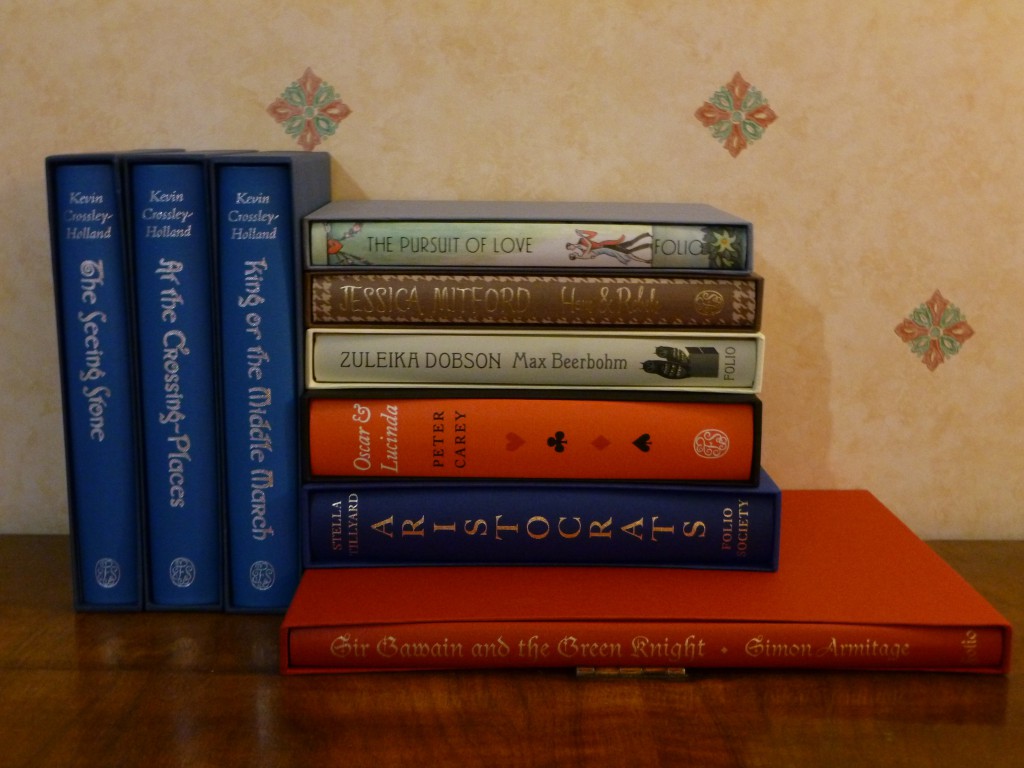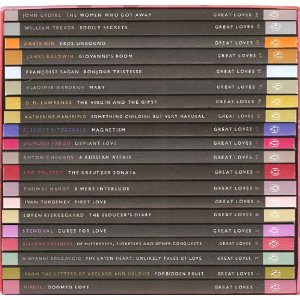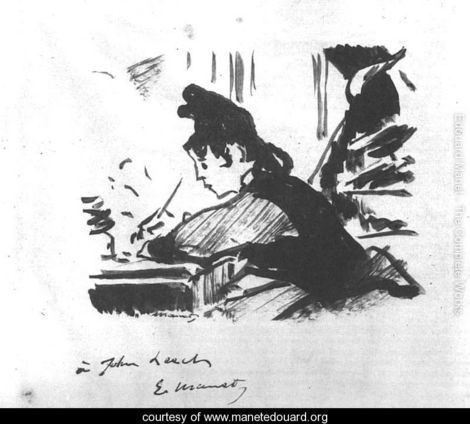Friday Reading Notes
As I have quite a few books on the go at the moment (and usually do), I thought it might be interesting to take a look at what I’m reading at the end of each week. It’ll be a while before these are reviewed, so I’ve decided that a few passing comments as I go along wouldn’t go amiss.
 The Man of Property by John Galsworthy - This is the first volume in the Forsyte Saga and the third book from my Classics Club list. I’ve not got very far in it yet, because it’s far too big and its corners are far too sharp to read on the tube without damaging either myself or another commuter, so it has had to shift to being my bedtime book. I like what I’ve read so far though: I’ve been plunged into the middle of a Forsyte family gathering and it’s exactly like being thrust into a real party of strangers. It’s all a glittering whirl of social activity, polite conversation and hidden meanings and I’m watching from the sidelines feeling part bemused, part intimidated, but wholly fascinated by the characters in front of me. I can’t wait to continue.
The Man of Property by John Galsworthy - This is the first volume in the Forsyte Saga and the third book from my Classics Club list. I’ve not got very far in it yet, because it’s far too big and its corners are far too sharp to read on the tube without damaging either myself or another commuter, so it has had to shift to being my bedtime book. I like what I’ve read so far though: I’ve been plunged into the middle of a Forsyte family gathering and it’s exactly like being thrust into a real party of strangers. It’s all a glittering whirl of social activity, polite conversation and hidden meanings and I’m watching from the sidelines feeling part bemused, part intimidated, but wholly fascinated by the characters in front of me. I can’t wait to continue.
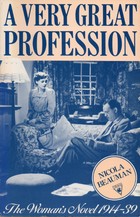 A Very Great Profession: The Woman’s Novel, 1913-1949 by Nicola Beauman – It’s been a while since I read any non-fiction, so it seemed serendipitous that I had this in my bag when I made my discovery that The Man of Property was too big to read on the train. Nicola Beauman is well known as the founder of Persephone Books, several of which I have read and enjoyed, and this book seems to be a sort of survey of that forgotten women’s literature that Persephone are republishing. The chapters are arranged thematically rather than by date or author, and so far I’ve only read the introduction and the chapter on war, but already the inside front cover of my copy is covered in the hastily pencilled details of titles I want to try. This is the sort of book that is bound to increase my reading list exponentially, as it is not only introducing me to loads of authors I’ve never even heard of, it is also making it very clear from the fascinating background material provided exactly why I should want to read each title and why they are important. It’s both an invaluable resource as well as interesting reading in its own right. I’ve really enjoyed finding out about women in wartime, how women’s war narratives differed from those of their male counterparts, and how both of these changed over time with the clarity of hindsight. A dangerous book for me and my book habit, but a fascinating one nonetheless.
A Very Great Profession: The Woman’s Novel, 1913-1949 by Nicola Beauman – It’s been a while since I read any non-fiction, so it seemed serendipitous that I had this in my bag when I made my discovery that The Man of Property was too big to read on the train. Nicola Beauman is well known as the founder of Persephone Books, several of which I have read and enjoyed, and this book seems to be a sort of survey of that forgotten women’s literature that Persephone are republishing. The chapters are arranged thematically rather than by date or author, and so far I’ve only read the introduction and the chapter on war, but already the inside front cover of my copy is covered in the hastily pencilled details of titles I want to try. This is the sort of book that is bound to increase my reading list exponentially, as it is not only introducing me to loads of authors I’ve never even heard of, it is also making it very clear from the fascinating background material provided exactly why I should want to read each title and why they are important. It’s both an invaluable resource as well as interesting reading in its own right. I’ve really enjoyed finding out about women in wartime, how women’s war narratives differed from those of their male counterparts, and how both of these changed over time with the clarity of hindsight. A dangerous book for me and my book habit, but a fascinating one nonetheless.
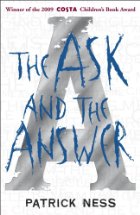 The Ask and the Answer by Patrick Ness – This one is the second book in Ness’ Chaos Walking trilogy. It was picked up this morning as my new train book (I tend to fall asleep on trains, which confuses me if I’m reading non-fiction), and it says a lot about it that I’m already nearly a quarter of the way through despite a light snooze. One of the things I’m enjoying about the young adult books I’ve been reading is how plot driven they are, and although I don’t think this one is shaping up to be quite as good as The Knife of Never Letting Go, it’s still fast paced and gripping. The first book was all presented from Todd’s perspective, but this one alternates his narration with Viola’s which I don’t find quite so interesting. The plot is still good and I have no idea where it’s going (always a good sign at this stage in a book) but the writing doesn’t feel quite as innovative the second time around.
The Ask and the Answer by Patrick Ness – This one is the second book in Ness’ Chaos Walking trilogy. It was picked up this morning as my new train book (I tend to fall asleep on trains, which confuses me if I’m reading non-fiction), and it says a lot about it that I’m already nearly a quarter of the way through despite a light snooze. One of the things I’m enjoying about the young adult books I’ve been reading is how plot driven they are, and although I don’t think this one is shaping up to be quite as good as The Knife of Never Letting Go, it’s still fast paced and gripping. The first book was all presented from Todd’s perspective, but this one alternates his narration with Viola’s which I don’t find quite so interesting. The plot is still good and I have no idea where it’s going (always a good sign at this stage in a book) but the writing doesn’t feel quite as innovative the second time around.
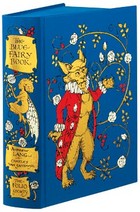 The Blue Fairy Book by Andrew Lang – I’ve had this lovely collection of tales on the go since sometime in December, but I’m in no hurry to rush reading such a beautiful volume. This was one of the books that persuaded me that I needed to join the Folio Society in order to make them mine, and reading through this one makes me so glad I gave in. It’s illustrated by Charles van Sandwyck with glorious watercolours and little pen and ink drawings so I seem to spend as much time gazing at the pictures as I do actually reading the text. The stories are a mixture of familiar fairy tales and ones I haven’t heard before, which always makes for interesting reading. Sometimes I only manage a story or two a week, but I’m quite happy savouring them.
The Blue Fairy Book by Andrew Lang – I’ve had this lovely collection of tales on the go since sometime in December, but I’m in no hurry to rush reading such a beautiful volume. This was one of the books that persuaded me that I needed to join the Folio Society in order to make them mine, and reading through this one makes me so glad I gave in. It’s illustrated by Charles van Sandwyck with glorious watercolours and little pen and ink drawings so I seem to spend as much time gazing at the pictures as I do actually reading the text. The stories are a mixture of familiar fairy tales and ones I haven’t heard before, which always makes for interesting reading. Sometimes I only manage a story or two a week, but I’m quite happy savouring them.
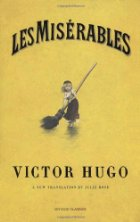 Les Miserables by Victor Hugo – Les Mis has been sadly languishing of late and through no fault of its own. I started this book and loved it almost immediately, but it’s big and heavy and (like Galsworthy) not a train book. It also was shunted aside for the less enjoyable more more easily accomplished task of reading Moby Dick. Now that that burden has been lifted, I’m looking forward to getting back to Les Miserables. I know I have a particularly good translation (thank you, Julie Rose) and the author’s voice shines through. Given his subject matters and reputation, I had expected Hugo to be a bit, well, miserable if I’m honest, but it turns out he has a wicked sense of humour and a great wit. I’d happily read him describing the exact layouts of houses for much longer than he does, which is saying something.
Les Miserables by Victor Hugo – Les Mis has been sadly languishing of late and through no fault of its own. I started this book and loved it almost immediately, but it’s big and heavy and (like Galsworthy) not a train book. It also was shunted aside for the less enjoyable more more easily accomplished task of reading Moby Dick. Now that that burden has been lifted, I’m looking forward to getting back to Les Miserables. I know I have a particularly good translation (thank you, Julie Rose) and the author’s voice shines through. Given his subject matters and reputation, I had expected Hugo to be a bit, well, miserable if I’m honest, but it turns out he has a wicked sense of humour and a great wit. I’d happily read him describing the exact layouts of houses for much longer than he does, which is saying something.
Has anyone read any (or all; these aren’t exactly new titles) of these? What did you make of them?
Moby Dick Part 3
 So, finishing Moby Dick didn’t quite go according to plan. I should have had it all done by 2nd February, but that deadline made a whooshing sound as it flew by (Douglas Adams would have approved) and I found myself almost at the end of February still with a quarter of the book to go. Although I’m a very long way behind, it seems sensible to stick to the original division of the book provided by The Blue Bookcase, so here’s my thoughts on part three.
So, finishing Moby Dick didn’t quite go according to plan. I should have had it all done by 2nd February, but that deadline made a whooshing sound as it flew by (Douglas Adams would have approved) and I found myself almost at the end of February still with a quarter of the book to go. Although I’m a very long way behind, it seems sensible to stick to the original division of the book provided by The Blue Bookcase, so here’s my thoughts on part three.
Surprisingly, I found myself enjoying this chunk much more than I did the previous two. I think this can largely be attributed to the fact that stuff has finally happened! There were whales! They chased the whales! They caught the whales! They killed the whales! They butchered the whales! All very exciting in a book in which, up till this point, the most action packed scene has been the one in which Queequeg got into bed with an unsuspecting Ishmael. In fact, I’m coming to accept that this book is structured in a way that (for me) sort of reflects the struture of a four year whaling voyage: there’s a long of long, tedious, monotonous crusing around waiting for something to happen, interspersed with very brief, intense, exciting bursts of action. Then we return to the monotony.
Speaking of monotony, I’m three quarters of the way through this book and still no Moby Dick. When is the eponymous poxy white whale actually going to show up? I think I’m more impatient about this than Ahab is now. He can’t hide for much longer; there’s only 125 pages left!
Bizarrely, it’s been Melville’s meticulous marine biology (which I’m finding much more interesting than his meticulous rope describing) that have given me the greatest sense of history so far. As their first whale caracass is being butchered, Ishmael describes the body of the whale and what each part does, with a chapter devoted to the impenetrable forehead which houses the precious sperm oil. At this point, it finally dawned on me due to the gaping omission in Melville’s unrelentingly thorough description that he (and indeed his contemporaries) had no idea what this massive forehead was for. A quick search of Wikipedia confirms that it wasn’t until the 1950′s that scientists discovered and properly described echolocation in toothed whales, and so Melville clearly thought that the sperm whale navigated using its tiny eyes and tiny ears, not knowing that the whale’s blunt forehead and the spermaceti contained within were provided one of the most complex and effective natural sonar systems in the world. Even the concept of sonar would have been completely alien to him. It feels a bit odd to know something about Melville’s specialist subject that he didn’t, but this, more than anything else for me, has rooted the novel back in the 1800′s where it belongs.
Onwards to the east to find the white whale in part four!
The Classics Club: 101 Classics
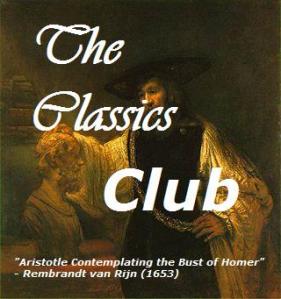 Every time I reorganise my bookshelves, or even spend too long looking at them, I find myself wanting to read all of them right now. Clearly, this isn’t possible as I have to do things like go to work, eat and occasionally talk to my husband, but what it illustrates is how much I love thinking about books that I’m not reading. A large part of my pleasure in books is derived from anticipating them and pondering them, just as much as actually reading them. Do I read this one next, or that one? If I read this one immediately after that one, will it not seem as good as I suspect it is? Should I plough through this series all in one go or leave gaps? Shall I immerse myself completely in this author’s works and read them all right now or will I find I reach saturation point and no longer appreciate them as much? Will I savour this author’s works and ration them out as I know there are only a limited number, or will I devour them all at once? I can occupy myself for hours in musings like this.
Every time I reorganise my bookshelves, or even spend too long looking at them, I find myself wanting to read all of them right now. Clearly, this isn’t possible as I have to do things like go to work, eat and occasionally talk to my husband, but what it illustrates is how much I love thinking about books that I’m not reading. A large part of my pleasure in books is derived from anticipating them and pondering them, just as much as actually reading them. Do I read this one next, or that one? If I read this one immediately after that one, will it not seem as good as I suspect it is? Should I plough through this series all in one go or leave gaps? Shall I immerse myself completely in this author’s works and read them all right now or will I find I reach saturation point and no longer appreciate them as much? Will I savour this author’s works and ration them out as I know there are only a limited number, or will I devour them all at once? I can occupy myself for hours in musings like this.
As a result, there are few things I love more than compiling lists of books. I don’t like to plan my reading in a regimented way (“I will read this, then this, then this”) but I do like thinking about the books that I might read, that I could read if I wanted to. That is the beauty for me of Jillian’s Classics Club, in which participants agree to read a certain number of classic books (according to their own definition of ‘classic’) over a certain period of time. It allows me to indulge my delight in bookish planning and list making, but it’s so unrestricted that it’s not going to feel like a chore. Books which have sat unread on my shelves for years are imbued with a certain allure now that I have placed them on my list, and already I can’t wait to start reading them all.
After much fiddling about with my selections, I’ve come up with the following list of one hundred and one classic books which I’m going to read over the next five years, so by 12th March 2017 (which seems improbably far in the future at the moment; good lord, I’ll be thirty by then). Despite my best efforts, I haven’t quite managed to create a list which is 50:50 men:women and English:translated fiction, but I’ve come as close as I can. Here they are, arranged by date. Titles marked with an asterisk are rereads or partial rereads.
Ancient World
- The Iliad by Homer (Ancient Greek)
- The Odyssey by Homer (Ancient Greek)*
- If Not, Winter by Sappho (Ancient Greek)
- The Aeneid by Virgil (Latin)*
- Beowulf by Anon. (Anglo-Saxon)*
1000′s
- The Pillow Book by Sei Shonagon (Japanese)
- The Tale of Genji by Murasaki Shikibu
- The Poetic Edda by Anon. (Old Norse)*
1100′s
- Lais of Marie de France by Marie de France (Anglo-Norman)
1200′s
- The Prose Edda by Snori Sturluson (Old Norse)*
1300′s
- Sir Gawain and the Green Knight by Anon.*
- The Decameron by Giovanni Boccaccio*
1400′s
- The Book of the City of Ladies by Christine de Pizan (Old French)
- The Book of Margery Kempe by Margery Kempe
1500′s
- The Faerie Queen by Edmund Spenser
1600′s
- Don Quixote by Miguel de Cervantes (Spanish)
- Complete English Poems by John Donne*
- The Princess of Cleves by Madame de Lafayette (French)
- Poems, Protest and a Dream by Sor Juana Ines de la Cruz (Spanish)
1700′s
- Letters of a Peruvian Woman by Francoise de Graffigny (French)
- Fanny Hill by John Cleland
- Tom Jones by Henry Fielding
- The Female Quixote by Charlotte Lennox
- Candide by Voltaire (French)
- The Sorrows of Young Werther by Johann Wolfgang von Goethe (German)
- Evelina by Fanny Burney
- Dangerous Liasons by Choderlos de Laclos (French)
- A Simple Story by Elizabeth Inchbald
1800′s
- Belinda by Maria Edgeworth
- Zofloya by Charlotte Dacre
- Corinne, or, Italy by Madame de Stael (French)
- Mansfield Park by Jane Austen*
- Persuasion by Jane Austen*
- Northanger Abbey by Jane Austen*
- Persuasion by Jane Austen*
- Marriage by Susan Ferrier
- The Physiology of Taste by Jean Anthelme Brillat-Savarin (French)
- Indiana by George Sand (French)
- The Black Spider by Jeremias Gotthelf (German)
- The Jew’s Beech by Annette von Druste-Hulshoff (German)
- The Three Musketeers by Alexandre Dumas (French)
- Agnes Grey by Anne Bronte
- The Tenant of Wildfell Hall by Anne Bronte
- Wuthering Heights by Emily Bronte*
- Jane Eyre by Charlotte Bronte*
- Shirley by Charlotte Bronte
- Vilette by Charlotte Bronte
- Vanity Fair by William Makepeace Thackeray
- The Scarlet Letter by Nathaniel Hawthorne
- The Devil’s Elixirs by E. T. A. Hoffman (German)
- North and South by Elizabeth Gaskell
- Wives and Daughters by Elizabeth Gaskell
- Little Dorrit by Charles Dickens
- Barchester Towers by Anthony Trollope
- Doctor Thorne by Anthony Trollope
- Framley Parsonage by Anthony Trollope
- Madame Bovary by Gustave Flaubert (French)
- East Lynne by Mrs Henry Wood
- No Name by Wilkie Collins
- Armadale by Wilkie Collins
- Aurora Floyd by Mary Elizabeth Braddon
- Felix Holt by George Eliot
- Middlemarch by George Eliot
- Lorna Doone by R. D. Blackmore
- War and Peace by Leo Tolstoy (Russian)
- The Brothers Karamazov by Fyodor Dostoyevsky (Russian)
- Short Stories by Guy de Maupassant (French)
- The Strange Case of Doctor Jekyll and Mr Hyde & The Weir of Hermistoun by Robert Louis Stevenson
- Dracula by Bram Stoker
- The Aspen Papers & The Turn of the Screw by Henry James
- The Awakening by Kate Chopin
1900′s
- Poems by Antonia Pozzi (Italian)
- The House of Mirth by Edith Wharton
- I Am A Cat by Soseki Natsume (Japanese)
- Portrait of the Artist as a Young Man by James Joyce
- The Forsyte Saga by John Galsworthy
- Kristen Lavransdatter by Sigrid Undset (Norwegian)
- The Waste Land and Other Poems by T. S. Eliot
- Passage to India by E. M. Forster
- Mrs Dalloway by Virgina Woolf
- The Great Gatsby by F. Scott Fitzgerald
- The Painted Veil by W. Somerset Maugham
- The Complete Sherlock Holmes by Sir Arthur Conan Doyle
- Lady Chatterley’s Lover by D. H. Lawrence
- Passing by Nella Larsen
- Their Eyes Were Watching God by Zora Neale Hurston
- Brideshead Revisited by Evelyn Waugh
- The Second Sex by Simone de Beauvoir (French)
- The Old Man and the Sea by Ernest Hemmingway
- Bonjour Tristesse by Francoise Sagan (French)
- Lolita by Vladimir Nabokov
- Doctor Zhivago by Boris Pasternak (Russian)
- Moderato Cantabile by Marguerite Duras (French)
- Catch 22 by Joseph Heller
- Wide Sargasso Sea by Jean Rhys*
- The Master and Margarita by Mikhail Bulgakov (Russian)
- Slaughterhouse 5 by Kurt Vonnegut
- The Complete Claudine by Colette (French)
- If On A Winter’s Night a Traveller by Italo Calvino (Italian)
- Sexing the Cherry by Jeanette Winterson
International Women’s Day: A Search for Classic International Women Writers
I’m really rather excited at the thought of joining in with Jillian’s Classics Club, a project which encourages you to read a certain number of classics (chosen by yourself) within five years. Although I would read plenty of classics in that time under my own steam, I’m signing up for two reasons:
- I enjoy the community aspect and I can’t wait to see other people’s choices and what they think about them
- I just like making lists
I’ve been happily compiling my list of one hundred titles that I’m going to read, and in doing so I’ve decided on a few parameters for my choices to make myself read a bit more diversely (otherwise I could fill half the list with Anthony Trollope). I’m trying not to read too many nineteenth century novels, much as I love them. In the interest of fairness, I want my list to be fifty percent male authors and fifty percent female authors. In order to challenge myself further I also want only half of the books on my list to be English language classics (although they will all have to be read in English, alas).
Unfortunately, these aims seem to be conflicting. I have a good selection of nineteenth century female English and American authors, and I have a good selection of classics in other languages written by men, but rarely the twain shall meet. As today is International Women’s Day, it seemed like the perfect opportunity to ask for suggestions for classic international women writers. Who is the Jane Austen of India? The Virginia Woolf of Italy? The Charlotte Bronte of China? Where are the female Tolstoys, Flauberts and Molieres? I assume they must exist. Please help!
Thanks to a bit of Googling, some wracking my brains and a perusal of the fantastic Alma Classics catalogue (a great place to search for less well known classics, particularly those in translation), I’ve managed to come up with the following ideas, but I would love more recommendations.
- The Second Sex by Simone de Beauvoir (French)
- The Complete Claudine by Colette (French)
- The Jew’s Beech by Annette von Droste Hülshoff (German)
- The Sailor from Gibraltar and Moderato Cantabile by Marguerite Duras (French)
- Lais by Marie de France (Anglo-Norman)
- The Book of the City of Ladies by Christine de Pizan (Old French)
- Poems by Antonia Pozzi (Italian)
- Poems by Sappho (Ancient Greek)
- The Tale of Genji by Murasaki Shikibu (Japanese
- Kristin Lavransdatter by Sigrid Undset (Norwegian)
This is the best I can do with my limited knowledge. Any suggestions?
February Summary
February may be a day longer this year, but it seems to have flown by. I’ve only had time for two reviews, which puts me perilously behind again, but I’m no longer allowing myself to worry about such things. I’m also still woefully behind on Moby Dick, which has hardly seen any progress at all since this time last month. I will conquer the great white whale in March though, I’ve promised myself.
Books read in February
This month I have read 17 books, totalling 4,195 pages, giving an average page number of 247. The low average page count is because of reading lots of tiny penguins in the Great Loves box set, interspersed with young adult and children’s books which weren’t exactly hefty either. Once I finish Moby Dick I’ll be starting to read larger books again, as I’ve discovered I don’t like having two giant books on the go at once (hence Middlemarch has been set aside for another day and I’ve parted company with the readalong). The books I read were:
- Doomed Love by Virgil (3)
- Forbidden Fruit: The Letters of Abelard and Heloise by Peter Abelard and Heloise (2)
- The Hunger Games by Suzanne Collins (4)
- The Eaten Heart: Unlikely Tales of Love by Giovanni Boccaccio (3.5)
- Of Mistresses, Tigresses and Other Conquests by Giacomo Casanova (2.5)
- Cures for Love by Stendhal (1)
- The Graveyard Book by Neil Gaiman (4)
- Charmed Life by Diana Wynne Jones (4)
- Catching Fire by Suzanne Collins (3)
- The Seducer’s Diary by Søren Kierkegaard (2)
- First Love by Ivan Turgenev (2.5)
- Lucy, or, The Delaware Dialogues by Babette Rosmond (4)
- Diary of a Provincial Lady by E. M. Delafield (3)
- Mockingjay by Suzanne Collins (2)
- Endymion Spring by Matthew Skelton (3)
- The Knife of Never Letting Go by Patrick Ness (4.5)
- A Mere Interlude by Thomas Hardy (2.5)
Of the Penguin Great Loves set that I intended to read in February, I got through eight of the twenty. Sadly, although they’re a very attractive collection of books, I discovered that I wasn’t overly keen on any of the stories inside them and those I did like I already have in other versions. One of them was even my first one star book of the year. My attempts to avoid reading them are what caused the explosion of young adult fantasy books onto my reading list. They may not be the most sophisticated of titles, but my goodness they’re fun to read.
Books acquired in February
Well, I may as well throw out my resolution about aiming for book neutrality right now, as February once more saw an abundance of books come into the house. Here they all are (minus three which are on loan or being read) lined up on our mantelpiece (yes, we have daleks on our mantelpiece; why do you ask?). Some of them have already been read, if that makes it any better…

The small stack of books on the left are ones I’m very lucky to have. Early in February I was contacted by the lovely Maureen Emerson to ask if I would like to review her book about Lady Winifred Fortescue and her friends in Provence. I adored Lady Winifred’s Perfume from Provence when I read it last year, so I jumped at the chance and was thrilled to receive a copy in the post soon after. February was a bit fraught with reading commitments, so I decided to save it for March and it will be coming off the shelf soon.
All the books on top of that are review copies provided by the ever so friendly people at Quercus Books (of Girl with the Dragon Tattoo publishing fame) at their Digital Shindig in February. I was thrilled to be invited along to the rather fancy bar Mason & Taylor in east London (where they serve Kraken rum; always a good sign!) to meet the team and some of their authors, along with a whole host of other bloggers and reviewers. It was an excellent evening, one of the best parts of which was being presented with a huge bag of goodies to take home, including bookmarks, chocolate and, of course, books. I was given copies of (bottom to top) The Cook by Wayne Macauley, Girlchild by Tupelo Hassman, Bereft by Chris Womersley, The Last Man Standing by David Longo, Breathless by Anne Sward and The Folded Earth by Anuradha Roy. A lot of them aren’t out yet, so I’m going to enjoy the slightly guilty frisson of getting to read something before I should do and write reviews to be posted nearer to their publication dates. How exciting!
Next to my review stack is an intriguing little box set of books on language. My interest in words, phrases, idioms and their origins was reawakened earlier this year by reading The Etymologicon by Mark Forsyth, and this set from The Book People, along with the rather more substantial and imposing Chambers Dictionary of Etymology (acquired for pittance as a Folio Society daily deal) next to the blue dalek, caters perfectly to my refreshed obsession. I’ve lost count of how many things I’ve looked up in the dictionary already, and the little Flavell books are so interesting I could easily read them cover to cover.
You might not think it from looking at this picture, but I’ve actually exercised some restraint this month with book buying. Whenever I go to the ballet after work (which is quite a lot thanks to their £5 tickets) I have to walk along Charing Cross Road on my way to the Royal Opera House. On one of the occasions when I went past in February, Any Amount of Books had all the stock in their basement reduced to £1 and somehow I only walked out with one (although I did acquire Memoirs of a Highland Lady from there earlier in the month)! This was The Love of Seven Dolls by Paul Gallico. I’ve not heard of this particular title before, but I really enjoyed The Small Miracle and Flowers for Mrs Harris by the same author when I read them last year, so I’m more than willing to give this one a go.
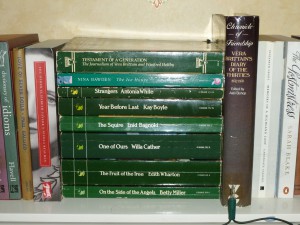 The Persephone snuggled up next to Paul Gallico is Nichola Beauman’s The Other Elizabeth Taylor, which I bought from Amazon Marketplace as an accompaniment to the Taylor centenary readalong of her novels which I’m taking part in on LibraryThing. Missing from the Virago pile next to that is, in fact, one of Taylor’s novels, Palladian, which was the February read (I had already swiped it for reading purposes by the time I took this photograph). There are a whole host of other Virago Modern Classics there which have been accumulated from various charity shops and second hand book shops, as I’m unable to walk past a green spine for a few pounds. This month saw me acquire On the Side of the Angels by Betty Miller, The Fruit of the Tree by Edith Wharton (unexpectedly large compared to her other books I own), One of Ours by Willa Cather (also unexpectedly large), The Squire by Enid Bagnold, The Year Before Last by Kay Boyle, Strangers by Antonia White and The Ice House by Nina Bawden. I also struck gold on the Winifred Holtby and Vera Brittain front, picking up copies of A Testament of Friendship and Friendship: Vera Brittain’s Dairies of the Thirties for just £1 each. They’ve reminded me that I really must let myself read another Holtby soon.
The Persephone snuggled up next to Paul Gallico is Nichola Beauman’s The Other Elizabeth Taylor, which I bought from Amazon Marketplace as an accompaniment to the Taylor centenary readalong of her novels which I’m taking part in on LibraryThing. Missing from the Virago pile next to that is, in fact, one of Taylor’s novels, Palladian, which was the February read (I had already swiped it for reading purposes by the time I took this photograph). There are a whole host of other Virago Modern Classics there which have been accumulated from various charity shops and second hand book shops, as I’m unable to walk past a green spine for a few pounds. This month saw me acquire On the Side of the Angels by Betty Miller, The Fruit of the Tree by Edith Wharton (unexpectedly large compared to her other books I own), One of Ours by Willa Cather (also unexpectedly large), The Squire by Enid Bagnold, The Year Before Last by Kay Boyle, Strangers by Antonia White and The Ice House by Nina Bawden. I also struck gold on the Winifred Holtby and Vera Brittain front, picking up copies of A Testament of Friendship and Friendship: Vera Brittain’s Dairies of the Thirties for just £1 each. They’ve reminded me that I really must let myself read another Holtby soon.
The Postmistress by Sarah Blake was a book that I didn’t intend to buy. The Old English Thorn and I have been expanding our collection of board games, and I spotted one we didn’t have in a charity shop the other weekend. As we both spend most of our waking hours in London, it’s rare for us to ever carry cash and so we found ourselves at the till with a £3.75 game and a £5 minimum spend to pay by card. So I was forced to buy a book as well. It’s a hard life.
The Folio Society books on the far end are partially the result of end of sale stock being discounted even further to a level at which I am unable to resist (not that I put up much of a fight) and one second hand acquisition. Unusually for me, both of the new books, The Physiology of Taste and The Gentleman’s Daughter by Amanda Vickery, are non-fiction. Hopefully having such attractive copies to read will encourage me to be better at reading factual books. North and South by Elizabeth Gaskell is a copy that I bought from ebay to add to my growing collection of Gaskell books as she promises to become a favourite author.
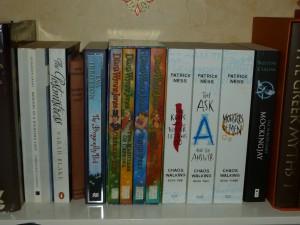 Last but not least, all the remaining books were part of my (re)discovery of young adult and children’s fiction. Daddy Long Legs by Jean Webster is considered a classic by many but isn’t a book I’ve ever read so I look forward to this one. Eva Ibbotsen was a favourite author when I was younger, but this title isn’t one I’ve ever read. It’s beautifully designed though. The Crestomanci books by Diana Wynne Jones were definitely ones I read. However, I only remember the first book in the series so I need to rectify that by reading them all again. The Patrick Ness books were recommended to me when I bought The Hunger Games and, serendipitously, The Book People had the whole set for sale for £6.99. I’ve already read book one and thoroughly enjoyed it, so I’ll be diving into the rest in March. Although the first two Hunger Games books aren’t pictured here as they’re already on loan to a friend, I bought and read through the whole trilogy in February, which is what sparked my interest in young adult books. Although I thought they decreased in quality (and integrity) as the books progressed, on the whole I enjoyed them and I’m grateful that they’ve led me onto other books that I may not otherwise have discovered.
Last but not least, all the remaining books were part of my (re)discovery of young adult and children’s fiction. Daddy Long Legs by Jean Webster is considered a classic by many but isn’t a book I’ve ever read so I look forward to this one. Eva Ibbotsen was a favourite author when I was younger, but this title isn’t one I’ve ever read. It’s beautifully designed though. The Crestomanci books by Diana Wynne Jones were definitely ones I read. However, I only remember the first book in the series so I need to rectify that by reading them all again. The Patrick Ness books were recommended to me when I bought The Hunger Games and, serendipitously, The Book People had the whole set for sale for £6.99. I’ve already read book one and thoroughly enjoyed it, so I’ll be diving into the rest in March. Although the first two Hunger Games books aren’t pictured here as they’re already on loan to a friend, I bought and read through the whole trilogy in February, which is what sparked my interest in young adult books. Although I thought they decreased in quality (and integrity) as the books progressed, on the whole I enjoyed them and I’m grateful that they’ve led me onto other books that I may not otherwise have discovered.
Book Neutrality Report
Books read: 17
Books acquired: 43 (At least it’s fewer than January)
Book neutrality for February: +30
Overall book neutrality: +68
Plans for March
Reading The Hunger Games, The Knife of Never Letting Go and Charmed Life has reminded me of how much I enjoy reading books with a good plot. I love engaging characters and beautiful writing, but I also like a good plot. This has filled me with the urge to read more fantasy books, the most plotty of the books I read, as it’s been a fair while since I last attacked one (with the exception of a few Terry Pratchetts, and he’s a genre all by himself). I’m behind on the Elizabeth Taylor read along and have Palladian still to read in addition to March’s book, A View of the Harbour, so I want to get caught up there. I also want to read Maureen Emerson’s book and at least one from Quercus. Other than that, I’m going to continue to read what I fancy, when I fancy.
Review: ‘Country of the Pointed Firs’ by Sarah Orne Jewett
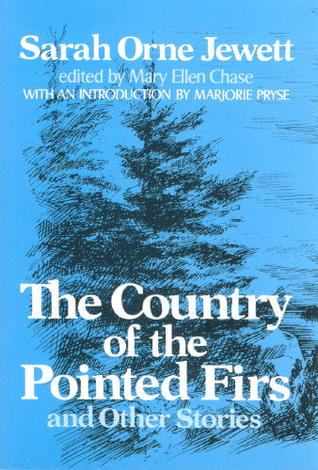 Back in January I wrote a bit about Sarah Orne Jewett, author of The Country of the Pointed Firs. She was such an interesting woman that I almost feel a bit guilty for not liking this book more than I did; Jewett’s critics complained that her stories lacked plot, something of which she herself was well aware, and (while I don’t think that this is always a bad thing in a book) in this case it didn’t agree with me.
Back in January I wrote a bit about Sarah Orne Jewett, author of The Country of the Pointed Firs. She was such an interesting woman that I almost feel a bit guilty for not liking this book more than I did; Jewett’s critics complained that her stories lacked plot, something of which she herself was well aware, and (while I don’t think that this is always a bad thing in a book) in this case it didn’t agree with me.
From reading the description and from the way that the book opens, I had expected The Country of the Pointed Firs to be a sort of American Cranford. Consequently, I was expecting to love it as much as I did Elizabeth Gaskell’s lovely novella when I read it last year. To say that I did not is a bit of an understatement: I didn’t dislike the book, I just thought it was ok. That’s not to say that I thought The Country of the Pointed Firs was a bad book, but it was one that didn’t work for me. It’s perhaps unfair of me to judge a book based on the merits of another, but the set up is so similar that I can’t help it. In both books the narrator returns to a small, unremarkable town that holds a place in her heart, and then proceeds to introduce the reader to the town’s residents and all the quirks that come with small town life. However, there the similarities end.
Although the concept is a lot like that of Cranford, the execution and the mood of the book are very different. Cranford chronicles the little, but all important, incidents in the lives of the women who live there, whereas The Country of the Pointed Firs is more of a series of character studies: Jewett introduces the reader to characters and more often than not just lets them sit there. Sometimes there will be an anecdote, occasionally there may be tea, but by and large nothing happens. This is not in the way that nothing happens in Cranford, where the little, everyday things are made to seem important to the reader because they are important to the characters, infused with Elizabeth Gaskell’s warmth and humour, but in a way that emphasises the slow and sedate pace of life and the reserved nature of its people. Whereas Cranford had a real feel of community to it, The Country of the Pointed Firs portrayed a life that was typified by, if not loneliness, then at least isolation, broken by occasional moments of contact with others. Most of the characters are widows, widowers, or people who simply never married. Some of them were intriguing (I particularly liked Mrs Todd and the widowed fisherman who sits alone in his cottage knitting) but I find myself failing to remember many of them.
The book starts out so promisingly:
When one really knows a village like this and its surroundings, it is like becoming acquainted with a single person. The process of falling in love at first sight is as final as it is swift in such a case, but the growth of true friendship may be a lifelong affair.
After a first brief visit made two or three summers before in the course of a yachting cruise, a lover of Dunnet Landing returned to find the unchanged shores of the pointed firs, the same quaintness of the village with its elaborate conventionalities; all that mixture of remoteness, and childish certainty of being the centre of civilization of which her affectionate dreams had told.
I expected to be made to feel all these things as the narrator discovered them anew, but I didn’t. Ultimately, how much any reader enjoys this book will boil down to how much they like the characters in it, because Jewett gives you nothing else to go on. As for me, I found the book interesting as a reading experience (particularly given my woeful lack of experience of American fiction), but one that was interesting in an intellectual rather than emotional way. I found myself unmoved.
If anyone would like my copy of this book, please leave me a message in the comments. It came from BookMooch, so it’s a bit battered and has occasional marginal notes, but I’d like to see it go to a good home as it’s not one I’m likely to read again.
The Country of the Pointed Firs and Other Stories by Sarah Orne Jewett. Published by Norton, 1981, pp. 296. Originally published in 1896.
Review: ‘Wildwood Dancing’ by Juliet Marillier
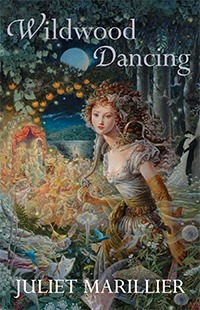 For the past few years, the Old English Thorn and I have spent New Year staying with some lovely friends of ours in Edinburgh. We play lots of games, eat lots of food, drink lots of dubious concoctions and generally have a marvellous time. Even so, there are always times when you just want to curl up with a book in the midst of all the fun. My first book of 2012 then had to be one which was engaging but not too taxing; one which I could abandon at a moment’s when called upon to make up numbers for a game and come back to several hours later without being confused; one which I could sit in the corner of the room and read while others were playing board games. I turned to a tried and tested author to meet the challenge, and so my first book of 2012 was Wildwood Dancing by Juliet Mariller.
For the past few years, the Old English Thorn and I have spent New Year staying with some lovely friends of ours in Edinburgh. We play lots of games, eat lots of food, drink lots of dubious concoctions and generally have a marvellous time. Even so, there are always times when you just want to curl up with a book in the midst of all the fun. My first book of 2012 then had to be one which was engaging but not too taxing; one which I could abandon at a moment’s when called upon to make up numbers for a game and come back to several hours later without being confused; one which I could sit in the corner of the room and read while others were playing board games. I turned to a tried and tested author to meet the challenge, and so my first book of 2012 was Wildwood Dancing by Juliet Mariller.
Like Marillier’s adult novels that I’ve read before, Wildwood Dancing is a take on fairy tales and folklore. This one combines aspects of the twelve dancing princesses and the frog prince, as well as drawing on Romanian vampire mythology and local folklore to give it a wonderful atmosphere. When their father becomes sick and must go away to be treated, Jena and her four sisters are left behind and Jena takes over the running of the family home. Times are hard, but the sisters find escape in their monthly nighttime visits to the fairy kingdom in the wildwood where they are welcomed as friends to join in the revels. Jena also finds solace in the company of Gogu, a frog with whom she is able to talk and who is her closest friend. However, their cousin Cezar does not believe that the girls can look after themselves and imposes himself on their lives. At the same time, he is also attempting to destroy the wildwood. Although he claims this is for the safety of the girls and the villagers, and as revenge for the mysterious death of his older brother Costi, his motives are not all that they seem.
A fairytale adaptation is always a double edged sword because its strength is also its weakness: I already know what will happen because I already know the story. I know that frogs kissed will turn into men, that how something is said is as important as what is said, and that you should always be careful what you wish for. Above all, I know that things are rarely what they seem. Anyone likely to read a book like this is probably approaching from a similar position of prior knowledge and experience, and it takes a skillfull author to manage to write a story that satisfies the fairytale conventions while escaping the trap of feeling like something that’s been read before. Juliet Marillier is such a writer (Daughter of the Forest is one of my favourite books) but this book didn’t quite get there for me. The story, while enjoyable enough, erred on the side of obvious, to the point of making some of the characters unreasonably dense at times in order to further the plot. There may be a dream sequence inserted to explain this, frankly, silly behaviour, but it feels like a contrived and flimsy way of excusing the heroine’s strange refusal to act on things which the reader can see that she obviously should.
Frustrations aside, there was a lot that I really enjoyed about this novel. I liked the Romanian setting and the way that this colours all aspects of the book, from the character names to the food to the folklore. I also liked the way that the setting, both the time and the place of the book, made Jena’s struggles to maintain her control over the family fortunes seem very real and understandable. All too often it is easy to dismiss fantasy heroines who are dependent on men for either their day to day existence or for rescue as weak or somehow deficient, but Jena has no choice but to cede to her cousin Cezar’s polite but forceful requests to hand over her family’s money and the running of their affairs to him. In fact, even though it feels wrong both to Jena and the reader, it is clear that what he is doing is the right thing albeit for the wrong reasons. I also loved the inventive descriptions of the wildwood folk and their celebrations, which were just the blend of expected fairy tale convention and authorial creativity which I have come to expect from Juliet Marillier.
On balance, this was an enjoyable but unexceptional book, though perfect for the situation in which I read it. It was entertaining but the story was too simple and obvious for it to be truly engaging and the interesting details of time and place, while they added flavour, were not quite enough to make up for this.
Wildwood Dancing by Juliet Marillier. Published by Tor, 2007, pp. 370. Originally published in 2007.
January Summary
While it may not have been the best month in any regular sense, January has been an excellent month on the reading front. I’ve discovered several new authors that I really like and reaffirmed some old favourites. I’ve realised I don’t like Moby Dick, but I’m now more than three quarters of the way through it and the end is in sight for the beginning of February. Already it feels like an achievement of leviathan like proportions (as Melville would undoubtedly say) and if nothing else it has reaffirmed my belief that there’s a huge difference between not liking a book and thinking that it isn’t any good. On the blog front I’ve decided to eliminate the review guilt and consequently feel much better about starting 2012.
Books read in January
This month I have read 13 books, totalling 3,703 pages, giving an average page number of 285. I’ve been reading shorter than average books in an attempt to counterbalance the leviathan (there’s that word again; Ishmael would be proud) waiting for me on the bedside table, but it’s been a good decision as it’s prevented me from feeling too bogged down in ongoing books. I did pick up Barchester Towers mid way through the month, but put it back after about twenty pages as I realised that it was the wrong book for now. I’m looking forward to coming back to it in February. The books I read were:
- Wildwood Dancing by Juliet Marillier (3)
- The Country of the Pointed Firs by Sarah Orne Jewett (2.5)
- Rivers of London by Ben Aaronovitch (4.5)
- The Etymologicon: A Circular Stroll Through the Hidden Connections of the English Language by Mark Forsyth (5)
- At Mrs Lippincote’s by Elizabeth Taylor (3)
- The Memoirs of Sherlock Holmes by Sir Arthur Conan Doyle (3.5)
- Corduroy by Adrian Bell (3)
- Equal Rites by Terry Pratchett* (5)
- The Phoenix and the Carpet by E. Nesbitt (4)
- Tamara Drewe by Posy Simmonds (4.5)
- Our Spoons Came from Woolworths by Barbara Comyns (3)
- The Other Queen by Philippa Gregory (2)
- Dancing Girls by Margaret Atwood (3)
Two five star books and two four and a halfs indicates a very good month in my book (no pun intended). Nearly all of the other books that I’ve read have been four or three star reads too, so even the less stellar books have still been good, satisfying reads. Long may it continue!
Books acquired in January
At the beginning of 2012 I stated that one of my aims for this year is to end it book neutral, and from that point of view the year is off to a terrible start! And you know what? I don’t care. Buying and owning books makes me happy. I love unearthing hidden treasures in charity shops, receiving parcels of well-loved volumes from other readers on BookMooch, unwrapping pristine new Folio Society volumes in all their gorgeous glory and spotting a deal on a long sought-after book that I just can’t pass up. As long as it still makes me happy and I have the disposable income to do so, I will continue to buy books. That said, this has been an unusually excessive month in terms of book acquisition, largely due to dangerous January sales from The Book People and the Folio Society supplementing my usual charity and second hand shop finds. So I’m going to revel in them, enjoy cataloguing and shelving them and resolve to be more circumspect next month. I’m certainly not going to feel guilty about it.
From new bookshops I bought four books. Jamrach’s Menagerie by Carol Birch and Rivers of London by Ben Aaronovitch were both acquired at Edinburgh Airport in a flurry of panic when we found out that our plane home had miraculously become a coach, meaning I would need much more to read to pass the time than I had anticipated. Of course, I promptly fell asleep on the bus so neither were read, but at least I was covered for all eventualities. The Twelve Poems of Christmas by Candlestick Press was bought for 99p in the Waterstones sale, and The Last Werewolf by Glen Duncan came along with it because I had no change and felt bad putting through a card transaction for less than £1.
From charity shops I have acquired three books. I was delighted to find a pristine copy of The Flavour Thesaurus for a mere £2, as it is both useful and witty. So much so that I think I’m going to have to read it cover to cover. The other two I picked up are for the Virago Modern Classics Collection: Our Spoons Came from Woolworths by Barbara Comyns and The Winged Horse by Pamela Frankau.
I acquired a second Barbara Comyns title, Who Was Changed and Who Was Dead, in one of my favourite second hand book shops on Charing Cross Road. At the same time, I pounced on a copy of The Clear Stream by Marion Shaw, a biography of Winifred Holtby which I’ve been wanting to read ever since we discussed it at the Virago Book Group. The Cambridge Guide to Women’s Writing in English edited by Lorna Sage also wandered into my possession to provide brief backgrounds for all the other interesting female writers that I’m discovering through Virago.
Another VMC came to me by way of Amazon Marketplace when I bought At Mrs Lippincote’s by Elizabeth Taylor for the VMC LibraryThing group read. Blue Remembered Hills, a memoir by Rosemary Sutcliffe in a beautiful Slightly Foxed edition also found its way to my gleeful hands from there. Slightly Foxed editions are each limited to 2000 copies and this one was out of print long before I discovered them, so when I saw a copy available in my price range I couldn’t resist.
Not much from my wishlist has come up on BookMooch recently, but I did manage to mooch two books that I’ve been after for ages. Prince of Dogs adds to my collection of Kate Elliott’s Crown of Stars series, which I’m going to start sometime this year. From the same user I also mooched a hardback copy of Tamara Drewe by Posy Simmonds, a graphic novel based on Far from the Madding Crowd. I read it instantly and liked it so much that the next day I ordered a copy of Pick of Posy, some of her older work, from Ebay.
Ebay also provided four new additions to my Folio Society collection (someday I’m going to have to take a picture of the bookcase that houses them; it is a glorious sight). I bought North and South by Elizabeth Gaskell as I loved Cranford so much and want to read more of her, then from the same seller I also acquired The Consolation of Philosophy by Boethius (I wrote my MA dissertation on this and an Anglo-Norman translation of it, so it holds a special place in my heart), Diary of a Provincial Lady by E. M. Delafield because I’ve heard so much good about it, and Folk Tales of Great Britian by Kevin Crossley-Holland.
Without doubt my biggest book purchase in terms of numbers came from The Book People’s January sale. Many of their books come in sets with others, and often they’re such good value that it’s cheaper to buy a whole set (even if it contains books I don’t particularly want) than it is to buy the individual books that I do want on Amazon. I bought their Antonia Fraser set of histories which comprises ten books for £3! Then there was the set of Maya Angelou books that I’d been eyeing up elsewhere but which were £4 for all six. Other sale bargains were Foundation by Peter Ackroyd, the amusing sounding Household Tips of the Great Writers by Mark Crick, Ripping Things to Do by Jane Brocket and Foyle’s Further Philavery by Christopher Foyle.
The biggest purchase in terms of finances was, hands down, my Folio Society sale order. But, if books from the Book People are great because they’re cheap, books from Folio are great because they are gorgeous. They may not look like much in their slipcases, but take them out and they are things of beauty that beg to be read and appreciated or just stroked occasionally. All of these were discounted by at least 50%, so I was powerless to refuse.
Book neutrality report
Books read: 13
Books acquired: 48 (I swear it didn’t feel like that many at the time!)
Book neutrality: +35
Usually I’m not one for planning ahead as I find great joy in spontaneity when it comes to reading. However, I feel that I owe it to Barchester Towers to give it the chance it deserves when I’m not already weighted down with too many other Victorian tomes.
Additionally, I’ve decied that in February I’m going to read my way through the Penguin Great Loves box set that I succumbed to from The Book People in October last year. As you might have noticed from my incoming books, I’m unable to resist their ridiculous deals, and this lovely set for £8.99 was just too much for my (admittedly limited) willpower. As it’s impossible to walk into a shop at the moment without being assaulted by a profusion of red and pink hearts, novelty chocolates, cuddly toys and cards of varying degrees of taste, I thought that February with its celebration of flowers and chocolates ahem, love would be an appropriate time to read though these books celebrating love in all its many forms. At a set of twenty books it may sound like a lot of reading, but they’re all slim volumes. I’ve added up the page count and it comes to a rather modest 2,410 which is perfectly manageable. It also may at first appear repetetive, but with authors as diverse as Anais Nin, Boccaccio and Thomas Hardy in the collection I doubt that a shared theme is going to make the books at all the same. It will also provide me with a short and manageable introduction to many famous authors that I haven’t got round to reading yet: of the twenty authors included in the box set, Kierkegaard, Thomas Hardy, Sigmund Freud, Virgil and Tolstoy are the only ones that I’ve read before. Bring on the month of Great Loves!
Moby Dick Part 2
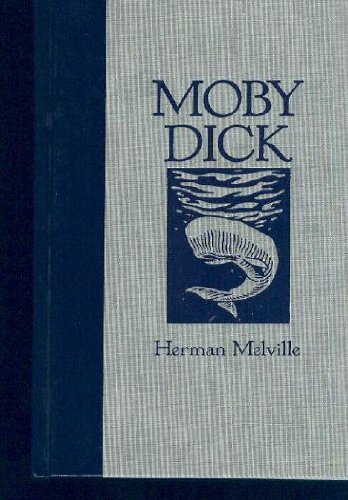 After two weeks of devoted evening reading I reached the halfway point of Moby Dick at the weekend! It’s taken me till now to organise my thoughts and write them down. It feels like a real achievement because I have to admit that, despite my best efforts to like it, this is not a book that I’m enjoying. Nonetheless, I’m still very grateful to the lovely people at The Blue Bookcase for for organising this read-along; at least I know I’m not suffering alone.
After two weeks of devoted evening reading I reached the halfway point of Moby Dick at the weekend! It’s taken me till now to organise my thoughts and write them down. It feels like a real achievement because I have to admit that, despite my best efforts to like it, this is not a book that I’m enjoying. Nonetheless, I’m still very grateful to the lovely people at The Blue Bookcase for for organising this read-along; at least I know I’m not suffering alone.
In my post on part one of Moby Dick I commented that it didn’t seem to be particularly big on plot but that I hoped things might pick up a bit once the Pequod set sail. All I can say is that it’s a good thing I didn’t hold my breath, as there’s still not a lot been happening. My hopes were raised when the mysterious Ahab finally came up on deck and gave a rousing speech to the crew, promising gold and glory for the death of Moby Dick, the great white whale, but that has so far proven to be all talk and no action. There’s been one brief, abortive whale hunt but apart from that, these chapters are what I’m coming to consider Melville’s usual mixture of reported anecdotes, digressions and essays and I’m starting to find all it a bit tedious. Still, he says that ‘As yet, however, the sperm whale, scientific or poetic, lives not complete in any literature. Far above all other hunted whales, his is an unwritten life‘ and I still have faith that Melville will eventually deliver this. He’s just going to do it in his own sweet time.
What I do like are the brief glimpses of character that Melville has provided; I find Ahab particularly fascinating. The way he keeps himself hidden below decks until the Pequod is in open waters was guaranteed to intrigue me, and he doesn’t disappoint when he finally appears. With his peg leg made from whale ivory and his sudden temper he cuts a forbidding figure, but he is somehow also magnetic. When he talks to the crew of Moby Dick and they respond with such fervour, they aren’t merely enthusiastic in reaction to Ahab’s promise of gold but to the charisma of the man himself. Ahab’s character is compelling and repelling and I’m looking forward to reading more about him (particularly now that Queequeg seems to have faded into the background and Ishmael become less a character than a narrative voice).
Unfortunately, I do think that Melville has made one huge mistake with Ahab, and that was allowing him a chapter of inner monologue in ‘Sunset‘. Apart from the fact that it really irritates me when authors decide to write a narrative in first person and then breaks out of it the first moment that it becomes inconvenient, I think it weakens the portrayal of the character to allow the reader into his head. Part of Ahab’s mystique is that he is aloof and unknown, so to see him thinking to himself ‘I’m demoniac, I am madness maddened!’ rather spoils the effect. That it is followed by a similar insight into Starbuck’s thoughts and Stubb’s in turn, then a bizarre playscript style interaction between various unnamed sailors of different nationalities means that it isn’t even special; the reader doesn’t see only into Ahab’s thoughts but also those of other, less important characters, and I found this very off-putting.
Another area where I disagree with what Melville does is in the presentation of his various treatises. I understand why he has Ishmael go into such minute detail about whales and whaling – it provides a reading audience who would probably be unfamiliar with the practice with the information needed to fully immerse themselves in the setting (although whether anyone needs to know exactly how thick the rope attached to a harpoon is in order to truly appreciate the novel is debatable). The problem that I have with this approach is that, by providing the reader with such a level of knowledge, Melville ends up distancing the reader from the story as it happens. The minutiae of whaling is provided by an older and wiser Ishmael, speaking with the benefit of hindsight and experience. However, this happens at the expense of the Ishmael in the present tense of the narrative who is on his first whaling voyage, completely inexperienced and almost as ignorant as the reader was before they had reams of information thrust at them. He is discovering all this for the first time too, presumably, but instead of allowing the reader to discover this information along with Ishmael, Melville has future Ishmael deliver it in dry lectures which are often devoid of any immediate connection to the plot. I appreciate the need for a certain level of background information, but I’m not convinced about his method of conveying it.
Although I’m not a fan of Melville’s essay chapters on the whole, I was amused at times by his chapter entitled ‘Cetology’, where the tedium (he actually feels the need to define what a whale is; surely in the 19th century people would have known this?) was lightened by the occasional touch of humour. I like his division of whales into ‘folio’, ‘octavo’ and ‘duodecimo’ as though they were books rather than living things. I was also tickled by his description of the ‘Huzza Porpoise’, as he terms it:
This is the common porpoise found almost all over the globe. The name is of my own bestowal; for there are more than one sort of porpoises, and something must be done to distinguish them. I call him thus, because he always swims in hilarious shoals, which upon the broad sea keep tossing themselves to heaven like caps in a Fourth-0f-July crowd.
This cheery image is only slightly marred by his later observation that ‘A well-fed, plump huzza porpoise will yield you one good gallon of good oil‘. I wish there had been more humour among the otherwise ponderous observations.
On a couple of occasions, the crew sing snatches of sea shanties and whaling songs. As I dyed in the wool folkie, I actually know a fair few of these songs which are still sung today, so I thought I’d leave you with two of my favourite whaling songs to get you in the mood for the second half of the book. It’s all downhill from here and there’s got to be some whaling action soon!
Eliminating the Review Guilt
It may have escaped the notice of any readers of this blog, although certainly not mine, that I am rather behind in reviewing books. In fact, I’m still writing reviews for books that I read in June of 2011. I recently counted up the number of books read last year that I have left to review. The total comes to more than seventy, meaning that even if I posted one a day it would be two and a half months before I actually started reviewing the books I’ve read in 2012, by which point I would of course be even further behind.
This seems a bit silly so, after much wrestling with my desire for neatness and linearity, I’ve come to the conclusion that it makes far more sense to start afresh with 2012 reviews, and fit in some of the older ones when I don’t have a current book to write about. Even though breaking out of my timeline goes against the grain somewhat, I feel much happier having made this decision.
So, onwards to 2012!
